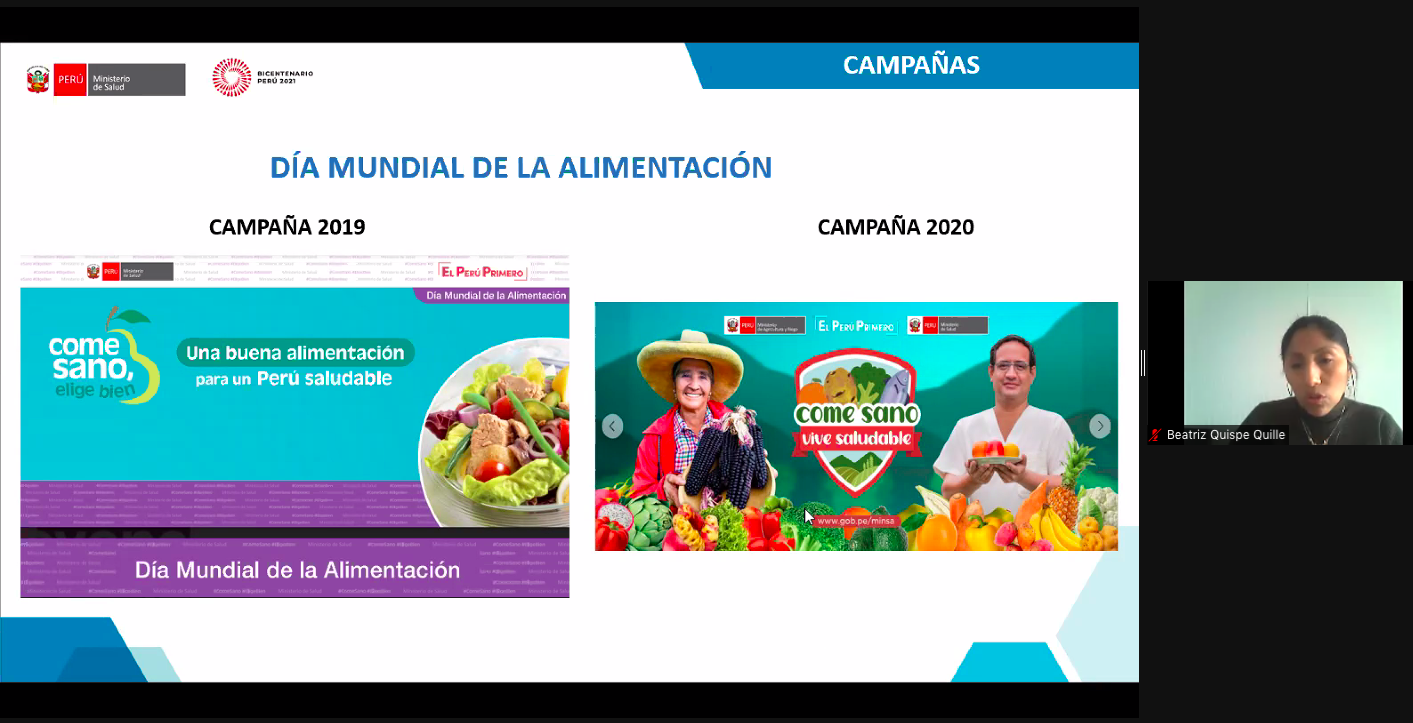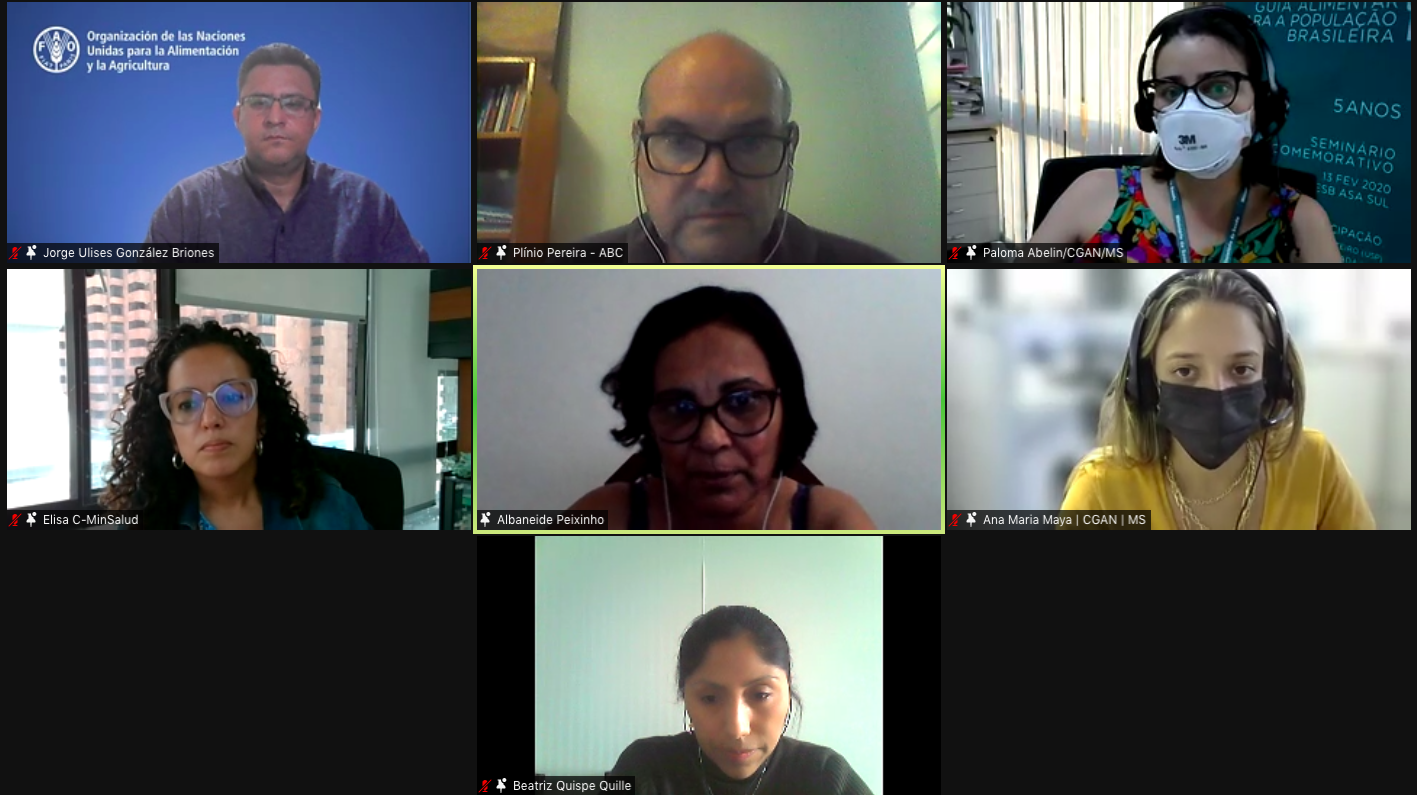
On Thursday, October 7, Brazil, Colombia and Peru participated in an online seminar to discuss the agenda for the International Year of Fruits and Vegetables, as part of the Nurture the Future project. This was the third Seminar held by the countries to build a joint effort for the implementation of policies capable of reversing the multiple burden of malnutrition, especially childhood obesity, which is the main objective of the South-South Cooperation project, carried out in partnership with the Ministry of Health of Brazil and the Brazilian Cooperation Agency.
This event aimed to share experiences developed by the health sector at the national level, aiming to contribute to the increased consumption of fruits and vegetables in Brazil, Peru and Colombia. Each country delivered a 15-minute presentation on their actions related to the topic and their importance for health promotion, providing an overview of national activities, including how they are organized, which are the most strategic, the strengths and challenges, in addition to forms of implementation, evaluation and monitoring.
In their presentation, representatives from Brazil highlighted the actions that the country is promoting as part of the 2021 International Year of Fruits and Vegetables, established by the United Nations. Brazil has already held five regional meetings, one for each region of the country, which enabled debates on how to improve the population’s nutrition through increased consumption of these foods. Paloma Abelim, Deputy Coordinator of the General Coordination of Food and Nutrition at the Ministry of Health, highlighted the importance of school canteens in offering even healthier foods. “We need to move forward so that canteens promote even healthier schools, with the offer of fresh and minimally processed foods,” she said.
Representatives from the Colombian Ministry of Health reported that, in order to promote healthy eating, food guides are produced in the country to clearly inform the population about fruits and vegetables. Strategies are also carried out in community environments, providing information on the importance of consuming fresh items with an emphasis on seasonal foods, which are more affordable during harvest season. Within the scope of school initiatives, one of the pilot projects currently underway includes cooking workshops that contribute to the consumption of fruits and vegetables, based on simple recipes and using local products. “School gardens are a strategy to encourage the consumption of fruits and vegetables from early childhood, and children are multipliers of this information for the adult population,” said Elisa Cadena, Deputy Director of Nutritional Health at the Ministry of Health in Colombia.
Finally, Beatriz Quispe, representative of Peru, highlighted that, as part of the national plan for nutrition, prevention and control of anaemia, the country trains health professionals to carry out nutritional consultations that emphasize the importance of consuming fruits and vegetables during pregnancy, breastfeeding and the first years of life. At the school level, the country has a series of normative documents related to healthy eating, with an emphasis on the consumption of fruits and vegetables. Among the communication strategies developed by the country to encourage the consumption of these foods are the dissemination, on social media, of online recipe competitions and partnerships with markets and vendors.

UN Year of Fruits and Vegetables as part of the Nurture the Future project
The inclusion of the topic of production, supply and consumption of fruits and vegetables in an incentive strategy for information networks supports countries in achieving the final objective of the Nurture the Future project, which is the implementation of policies capable of reversing the multiple burden of malnutrition, especially childhood obesity. Encouraging the consumption of these foods is essential for promoting adequate and healthy eating, with greater diversity in food consumption, which plays an important role in preventing chronic non-communicable diseases and all forms of malnutrition.
In the coming months, the project will continue to disseminate support materials so that managers can promote these discussions in their localities and ensure that their populations have healthy eating habits and a more productive life. The Nurture the Future project is the result of a partnership between the WFP Centre of Excellence against Hunger Brazil, the Ministry of Health and the Brazilian Cooperation Agency. Learn more here.




